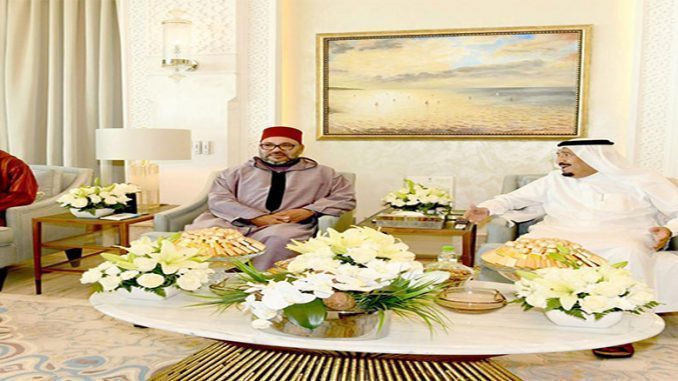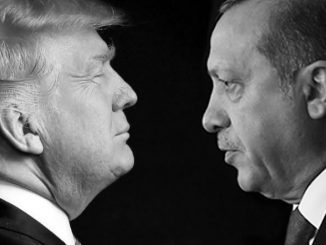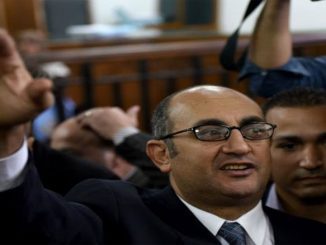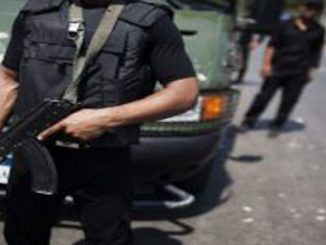
The royal’s holiday is expected to account for 1.5 per cent of north African country’s foreign tourism revenue – amid austerity measures by the Saudi government, including new fees on expats and companies.
Saudi Arabia’s King Salman spent $100m (£77m) on his annual summer holiday to Morocco, according to the Independent.
The royal was greeted by Moroccan Prime Minister Saadeddine Othmani at Tangier airport in July as he made his way to his 74-acre purpose-built summer palace, according to local media.
King Salman arrived for his annual break with an entourage of over 1,000 people, according to the Haaretz newspaper. Ministers, advisers and relatives were booked in to the city’s most luxurious hotels.
In 2016, vast renovation works were carried out on the property, including the addition of new buildings, helipads and a big top tent to entertain guests.
This year’s visit is being hailed as a welcome boost for the local economy and the holiday is expected to account for 1.5 per cent of the country’s foreign tourism revenue, according to Spanish paper La Vanguardia.
Saudi King landed in Indonesia with 459 tonnes of luggage and two Mercedes last March
While the average plane passenger worries about exceeding their few kilograms of baggage allowance, Saudi Arabia’s King Salman bin Abdul-Aziz landed in Indonesia with 459 metric tonnes of luggage. The royal was also joined by 800 delegates and 620 staff.
Along with his 620 staff, he touched down in the world’s largest Muslim-majority nation with two Mercedes-Benz saloon cars and two electric lifts, among hundreds of other goods.
The weight of those goods is equivalent of more than three blue whales’.
As well as his entourage, 800 delegates joined him on the royal visit, including 25 princes and 10 ministers.
The whole party needed 27 flights to get them to Jakarta and 10 more will be required to transport them to Bali – the next stop of the king’s Asia tour – according to PT Jasa Angkasa Semesta (JAS), the freight firm which brought the goods.
Indonesia has deployed at least 9,000 police and military for the visit, with roads closed to traffic and snipers positioned along the route of the king’s convoy.
The 81-year-old ruler descended slowly on his personal escalator from the plane, where he was met by Indonesian President Joko Widodo who escorted him along a red carpet flanked by guards to a limousine.
Saudi Arabia imposed monthly fees on expats from July 2017
Among Saudi austerity measures, the government imposed new fees on expatriates starting from July 2017. The move, announced by the finance minister Mohammed Al-Jadaan while presenting the 2017 budget, is aimed at prompting companies to hire locally.
The new fees were imposed on foreign nationals working in the commercial sector till 2020. Expatriates working as drivers, cleaning and domestic workers are excluded from these fees.
Starting from July 2017, a fee of SAR 100 ha been paid on a monthly basis, for every dependent or sponsored person. The kingdom expects to generate nearly SAR 1 billion revenue from this tax.
In 2018, a monthly tax of SAR 400 per foreign worker will be imposed if the number of expatriate employees exceeds the number of Saudis. For companies with fewer expatriates than locals, the tax will be SAR 300 per person. In addition, SAR 200 will be paid monthly for every person sponsored by an expat employee. Estimated revenue is seen to be SAR 24 billion.
In 2019, this tax will rise to SAR 600 and SAR 500 respectively on a monthly basis. Tax revenue is projected to reach SAR 44 billion.
In 2020, the tax will increase to SAR 800 and SAR 700 respectively per month. The kingdom targets SAR 65 billion in revenue from this tax.
Fees of SAR 300 and SAR 400 will be paid monthly for every person sponsored by an expat employee in 2019 and 2020, respectively.



